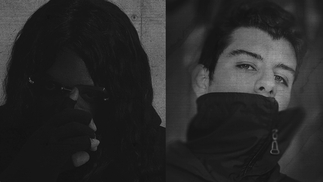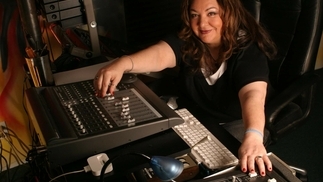DANCE MANIA: HOUSE HYSTERIA
Dance Mania transformed Chicago house from its '80s roots to a rough, raw, x-rated version that banged harder than anyone else. Now, after 13 years absence, the label is back by popular demand alongside a new Strut compilation that reminds the world just how influential it still is...

If Live Nation, SFX and Beatport owner Robert Sillerman is hoping to monopolize the world of EDM, then he may just be copying Daft Punk, who've already monopolized the answer to the question, “Who was your influence in getting into electronic music?” Today's fresh-faced stars might consider the robotic dance music duo as the godfathers of EDM, but Thomas Bangalter and Guy-Manuel de Homem-Christo were once excited teenagers themselves. And so far, it seems, there hasn't been very much digging into what it was that set them off on the road to becoming global superstars.
Fortunately, you don't need to look far. “Teachers,” the squelchy roll call of Daft Punk's musical mentors, on their 1997 breakout album Homework, laid down the bricks and mortar from which, their house – or, more specifically, house music – was built. It touches on Detroit techno, New York house legends, Dr Dre and Beach Boy Bryan Wilson, but most of all it highlights an obsession with Chicago and the sound of one label, Dance Mania.
Paul Johnson, DJ Funk, DJ Rush, Waxmaster, Jammin Gerald, Lil Louis, DJ Deeon, DJ Milton, DJ Slugo, Parris Mitchell and Robert Armani, all artists name-checked in “Teachers”- itself a homage to Parris Mitchell's 1995's “Ghetto Shout Out,” featuring the vocals of Wax Master. They're also all Dance Mania regulars whose rugged, raw and often rude take on house music – dubbed ghetto house - is again bubbling in the underground, thanks to the relaunch of Dance Mania and the respect of labels such as Clone's Jack For Daze, Night Slugs and LA Club Resources.
“I would say 95 percent of people are back on board,” says Ray Barney, label head and lynchpin, when we reach him over Skype to discuss its return, following 2000's closure alongside Barney's Records, the shop and wholesale distribution business that Ray inherited from his father, and was the central point that focused all Dance Mania's energies.
“We were not a label where we had any kind of conflict with artists,” he goes on with obvious sincerity. “I mean, we were like family. I had a big brother/little brother relationship with all the guys.”
The family is back together, minus a few stragglers, for Hardcore Traxx: Dance Mania Records 1986-1997, a compilation, which whittles the label's 300 plus releases into 24 stone-cold classics (out now on Strut). Starting with Hercules’ “7 Ways,” a sexually charged track by Chicago early house royalty Marshall Jefferson, and culminating with the frenetic and obscene dress-to-sweat antics of “Work Out” by Top Cat, it traces Dance Mania's evolution from challenger to DJ International and Trax Records, Chicago's first two house labels, which scored huge international hits, to a totally different animal altogether.
It's encapsulated in standouts such as the anthemic “House Nation” by The House Master Boyz And The Rude Boy Of House, ever-fresh party banger, “Feel My M F Bass” by Paul Johnson, whose illustrious career includes chart hit “Down Down Down,” and Duane & Co's “J B Traxx.” The latter, a raging whirlwind of claps and sampled exhortations written by Duane Burford, provided the label with its first track as well as its name when Burford offered up Dance Mania, something he'd previously used for a self-released single. “I was like, why not,” remembers Ray off-handedly, “it sounded like an appropriate name.”
Most prominently featured, however, is Victor Parris Mitchell, who appears as Victor Romeo for the soulful vocal ride “Love Will Find A Way” (featuring Letreece Brown) and the rolling, breakbeat filled “Ride The Ride Rhythm,” as Rhythm II Rhythm for the smoother “A Touch of Jazz,” and as Parris Mitchell, his current moniker, for the seminal “Ghetto Shout Out.”
Introduced to Ray Barney in 1987 by Vince Lawrence, co-author of Jesse Saunders' “On and On,” widely considered the first ever house track, Victor's initial experience wasn't exactly the stuff that dreams are made of. “At that time Ray said he wasn't looking for anything new but give him a call later,” chuckles Victor, who switched back to making R&B, which he'd been doing previously having started guitar lessons at age 12.

FAR-REACHING
He tried, and failed, to make a deal with Larry Sherman of Trax Records, and met with Rocky Jones, head of DJ International, but felt the label's roster was too crowded. So when Victor and Ray's paths eventually crossed again, Ray agreed to release Victor Romeo's “You Can't Fight My Love” on Bright Star Records, another one of his labels.
It was distributing records from DJ International and Trax Records that had originally turned Ray onto the new sound coming from his native city, “I would imagine there were no hit records that happened in Chicago and didn't come through our store,” he says proudly, but Dance Mania's output, which leant toward a harder sound for dancers, rather than the radio, meant that it acquired an underdog status whose influence wasn't immediately apparent. “I knew we were doing good music, I knew we were doing music that was popular in the clubs, was popular in the underground scene. I did not know the far reaching effects at the time that we were doing it. It was for parties in the neighborhood.”
Central to this was a club called The Factory, which was located at 4711 West Madison Street until it burned down in 1994, originally manned by DJs Quick Mix Claude and Greg the Master, but soon home to growing Dance Mania stars. “I think what came out of that was the younger generation, and what grew out of that was that the tempos got a little faster throughout the years,” explains Victor on the pumped tracks that characterized Dance Mania's breakaway from its '80s roots, bpms rising to 140 to lay the ground for juke then footwork. “Jammin Gerald came out of that, DJ Funk came out of that, some of the other guys.”
“I think I noticed the transition coming along,” adds Victor on this change, which had previously seen DJs pitching records up as far as possible and even modifying turntables to play faster than their intended speed. “Because the label was what it was, if you listen back to Lil Louis, from his earlier tracks, even Marshall Jefferson, a lot of their stuff was a lot rawer than the stuff that you'd hear on DJ International. Then Robert Armani came along and his tracks were really stripped down. Their tracks were bridging the barrier and it evolved from that sound.”
EXPLICIT
Coming to be labeled “ghetto house,” a term attributed to DJ Funk (whose interview follows), tracks like DJ Deeon's “Da Bomb,” Jammin Gerald's “Black Women (Club),” and Traxmen & Eric Martin's “Hit It From the Back,” all revolve around the explicit concerns of its audience, namely sex, drugs and partying.
“Where music was at that time, if you listened to a lot of Schooly D and NWA, all that stuff, that's what was happening in society,” says Victor. “There was this big thing about having explicit lyrics stickers at the time. They were censoring records so everybody was like, screw the censorship.”
Yet by the time Daft Punk came knocking, Victor had moved on to working with artists on Death Rows Records and doing remixes for mainstream stars like Janet Jackson (“It took me years to catch up to that, I did not know,” he laughs on the French duo visiting Chicago) and by 2000 both the shop and label closed.
“The fact that Ray had the record shop, and he had a thriving business so he didn't have to depend on record sales, that's why he could release so many records,” Victor says of the prolific run that preceded this. “That's where I met Wax Master. I used to work at the retail shop. I met him through a mutual friend when he came to sell some mixtapes. That's where I met DJ Funk. Funk used to just come in. The wholesale shop was upstairs so you had to come past me. I met loads of celebrities because anybody who was anybody would come through there. I'm talking about Outkast, they came in before their very first record, I didn't know who they were, and handed me a tape before it was released. If you were on a promotional tour, you had to come there.
“It was pretty sad when it closed but at the time you had so much going on with the market changing. I remember Ray saying, 'hey man, pretty soon they're not going to even need record stores.' He predicted it.”
What they didn't predict was the enduring popularity of Dance Mania or the return of record buying. With online marketplaces like Discogs providing an international forum to buy and sell records, EPs such as Paul Johnson's “11 P.M. Music/2 A.M. Music” currently sell for up to over $100.
Having moved into real estate, for a while Victor completely gave up on music, while after what he calls some “soul searching” Ray was working in his family's health food store. It was in 2009 when Victor started up a Parris Mitchell Facebook page. “I didn't really pay much attention to it but I noticed that I had a couple messages on there from a gentleman named Jamie Fry.”
JUKE JOINTS
The man behind Berlin label Deep Moves, this led to the release of “Juke Joints Vol. One,” featuring tracks taken from his '94 Dance Mania album Life in the Underground, while more recently the EP was remixed by Fort Romeau, Cassy and Ryan Elliot, and “Juke Joints Vol. Two” presented three brand new tracks shot through with Dance Mania energy.
In 2010 Berliner Bakey Ustl also sampled Parris Mitchell's “All Night Long” for his track “Tender Places,” reviving its joyous piano chords and lewd and live chorus, “clap your hands in you wanna fuck, stomp your feet if you wanna suck.” The track, which Victor wryly notes went “totally unnoticed,” after its original 1995 release, “it went right over people's heads,” was then reissued in 2012 by Ukrainian label Wicked Bass, a remix from Night Slugs boss Bok Bok relinking Parris to the current wave of underground talent and splashing his name across blogs worldwide.
“I wasn't really thrilled about doing it at first,” admits Ray on Victor gradually wearing him down to restart the label, “I was feeling my life had taken another turn, I was into other things. But want I wanted to do was set the record straight. I was reading lots of things about people taking over Dance Mania, and that bothered me a little bit. Another thing was that I just felt obligated to try for the guys who made music, to get them proper compensation for what they didReissuing classic releases, with exclusive new tracks and mixes, before concentrating on original work, so far the vaults have been opened to unleash sought after productions from Robert Armani and Steve Pointdexter, while fresh cuts have already dropped from footwork pioneer Traxman. New tracks are also in the works from Jammin Gerald and Parris Mitchell himself, who is also working with Nina Kravitz, remixing Radio Slave for Rekids and looking to collaborate with Actress, who he met at a Red Bull Music Academy party in Chicago.
“We still underdogs here in Chicago,” laughs Victor, his reintroduction to the world still more likely to get him a show in New York, or even Europe, than his home city. The ball is rolling and the history books are being rewritten—obscenities and all.
“My highlight was just the bond I had with people, the friendship,” replies Ray when we ask him what he cherished most from the label's formative days. “It was not like, ‘here's a guy doing a record company, and there's some guys putting out records.’ We were actually friends and I'm glad for the relationships I made. I mean, the people I dealt with over the years who have gone on to do other things; you think about Lil Louis, Marshall Jefferson, Byron Stingley, Paul Johnson, Parris Mitchell. I dealt with Hula Mahone, who was part of The Outhere Brothers, who gained a lot of popularity overseas. If you list the people who came through the doors that I dealt with personally, you'll be amazed.”
There may never be another Barney's, but its memory lives on in the stories, the memories and the music of those who were united by Ray's vision and love for those sharing his journey.
He Got the Funk
One of Dance Mania's most enduring artists, DJ Funk's name is synonymous with ghetto house, having coined the phrase on his 1996 EP “Ghetto House Anthems.” With a straight-up love of bass and booty, he's recently collaborated with Zombie Disco Squad for Made to Play and Kill Frenzy on dirtybird, and is still dropping body hammering jackathons of his own such as “High Frequency,” a highlight of Boys Noize's recent 13-track A Tribute To Dance Mania compilation. Promising “additional EDM booty bass music” on Mad Decent and Dim Mak, we sat down to reminisce about the label that discovered him...
How did you originally get involved with Dance Mania and what did it mean to you in terms of an artist? What were you doing before you hooked up with Ray and crew?
“Well, I pressed up my first record on my own and I took it to a lot of the big records stores in Chicago. One of the stores I took it to was Barney's Records. Many stores were constantly reordering records and Bud, Ray's brother, suggested I should sell to Ray.
He said to me, 'I could move a lot more of these records if you want me to.' I didn't really understand distribution at the time, but I was a big fan of Snoop Dogg and Dr. Dre and hearing them talk about selling records out of their trunk. I had no idea how big of an influence that Dance Mania was to the EDM scene.
Dance Mania was one of the biggest underground labels and I was oblivious that this was worldwide until I started getting licenses from Sony Music - wow, Michael Jackson's label - and started traveling internationally a few years after. Before Dance Mania I was just an average ghetto kid, living a ghetto life around a lot of BS, trying to stay out of trouble. Coincidentally, the club we started hanging out at was called Barney's and I would go over every weekend. This was my inspiration to start DJing. I didn't know who Ray was at the time, but he had hottest Chicago club packed every weekend and DJs would rent it out.”

Ray has said Dance Mania always felt more like a family than a label. Who were your biggest allies on the label?
“Everyone was fam and we all started out as young guys in a small clique. The one thing I miss right now is going there and hanging out because it was like an unofficial hangout spot and Ray was a mentor to all of us. Many big time DJs in the music industry would pop in and you never knew who you would see! I collabed with DJ Deeon and Jammin Gerald mostly. Me and Gerald go way back though, we used to DJ at one of the biggest clubs on the west side called The Factory. I actually met Deeon at Barney's, and at the time there was a Westside-Southside rivalry like the Eastcoast-Westcoast thing [laughs]. But our music had good flow together. There wasn't many times where our tracks weren't played together. Doing collabs with DJ Deeon fit perfectly and the records were just as big as mine. Even though we didn't know each other at the time, when I'd hear his records, it sounded like something I would make!”
When Dance Mania closed and Barney's also shut down, what did it feel like? Was it hard to move on from a label that you had helped to define?
“Nope. When we first started producing and selling CDs, we would be able to obtain a fair price for our music. Then all the bootlegging and piracy issues made that hard. For instance, if we sold a CD for $10, the bootlegger would sell it for $1-$2! This is why it wasn't hard for me when Dance Mania closed. I stopped making mixtapes and transitioned to only making unreleased tracks for my DJ set. It didn't affect me negatively, but it was kinda sad.”
Ray credited you with inventing the name 'ghetto house' from one of your EPs.
“I was trying to come up with a name for the album, and I was looking at the equipment I was using to make it. I had a Casio RZ1, a Roland R8, an analog keyboard, a 4-track, possibly a reverb or a compressor and a DAT machine. It wasn't a lot, but that's what I had to work with. I'm in my room in the hood, trying to think of a name, so I thought 'Why not call it ghetto house?' I stay in the ghetto and I'm doing house music!
This is the same way I named my other records ‘Booty House Anthems.’ Some people might not know, but I have a house record called ‘Ghetto Tech’ from before the genre was even used. I never really took a lot of credit for the genres. They were the names of my records, but people saw them as genres. I was telling my friend today, ‘It's so crazy, but when an artist is the first at something it can start a whole genre of that one style. Who was the first person to do hip-hop, dance, pop, rock, classical music or any genre for that matter? I feel honored that they would take the name of my records and turn them into genres.' Of course, I don't think that my 'Twerk That Sh*t To the Floor' record in the early 2000s defines the new genre of twerk music, but jussayin...”
What's next for you in terms of releases and shows?
“I'm working with a few of the biggest artists and producers in the EDM industry right now and finally just released Booty House Anthems 3. As far as shows, come check me out!”





